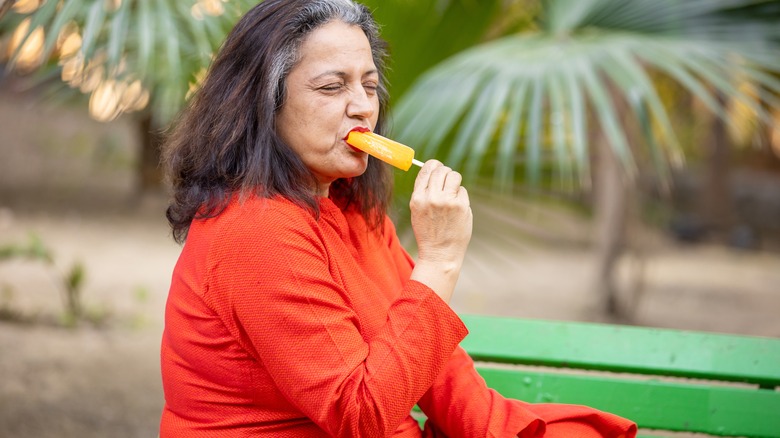What Happens To Our Sense Of Taste As We Age?
We've all come to expect some changes in our bodies as we get older. The appearance of gray hairs and a few more wrinkles are just a couple of ways we begin to show age. But there are plenty of other ways aging affects our bodies. Our muscles begin to lose strength, and we might not have as much stamina as we did when we were younger. With age, our cells also slow down, and according to WebMD, the health of many people tops out at around the age of 30.
Of course, aging isn't the same for everyone. How your body adapts to the aging process is a result of many factors including your genetics and medical history. But there are some changes you can almost count on. For instance, WebMD points out that by the age of 40, most people will need reading glasses, and some people 60 years or older will need a hearing aid. In addition, MedlinePlus reports that most people begin to notice a change in how things taste around the age of 60.
Our taste buds weaken with age
We have about 10,000 taste buds on our tongues, and each bud sends signals to our brains, according to MedlinePlus. That may sound like a large number of taste buds, but that number decreases as we age. In addition, the taste buds that remain begin to shrink, and that results in a diminished sense of taste. On top of that, our mouths produce less saliva as we age, and a dry mouth can further weaken our sense of taste. Since smell and taste are closely related, a loss of smell can also affect how some foods taste.
A loss of taste has several consequences. It could make eating less enjoyable, and that can result in eating smaller amounts of food. Not eating enough may lead to malnutrition. Moreover, when you experience a lack of taste, you might also be tempted to add more salt and sugar to foods to increase their flavor. This could be problematic, especially if you have diabetes or high blood pressure, says Mayo Clinic.
Other causes and treatments
While you can expect to experience some loss of taste as you age, taste can also be affected by other factors. The National Institute of Aging (NIA) explains that some medications, like antibiotics and drugs to lower blood pressure and cholesterol, might alter your sense of taste. Gum disease, other infections in your mouth, or issues with dentures can also be a culprit in altered taste. Some diseases, like COVID-19, can cause a diminished sense of taste. Even alcohol can affect how food tastes.
If you find that your taste isn't what it used to be, the NIA suggests eating colorful foods like sweet potatoes, carrots, broccoli, and tomatoes. You should experiment with mustard, garlic, onions, lemons, ginger, and other zingy foods to make your meals more palatable. Nuts, cheese, olive oil, and herbs like rosemary, thyme, and sage might also help. You should consult with your doctor about any concerns you have regarding your sense of taste.



